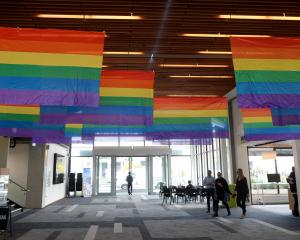The new University of Otago year brings vitality and vibrancy to Dunedin.
The ghost town which is north Dunedin in the holidays bursts into action.
A new stage in life begins for thousands of our youth as they leave behind home towns and parents' nests.
They set forth with the opportunity to "fly" in their studies and in their personal growth.
They have the chance - like the second, third and fourth-years - to begin to "take their place in the world".
The unique Otago campus environment gives them the scope for friendship and experience beyond what Wellington, Westport or Whangarei can offer.
They inherit the mantle of students gone before, and in this regard a potentially disruptive minority of students faces choices. Will they go the way of riots and disorder, or will they have harmless fun in the best traditions? The first time or two a couch was burned in the middle of a north Dunedin street or on the terrace at a cricket match at Carisbrook, the activity was unusual and worthy of a smile or two.
A few years later, all novelty had worn off and lighting fires had become dangerous antisocial arson. Once, in one of the most famous pranks in the university's history, a bicycle was discovered perched on top of the clocktower.
What a contrast to smashing bottles, ripping up letterboxes and taunting police.
Initiations these days, minus the extremes and any tendencies towards cruelty, still have a place - as Canterbury physiotherapy students showed last week at Brighton.
Orientation's "gross" events in the fresher competition are amusing and the annual toga party brings students to the heart of Dunedin in a positive way.
Everyone, with commonsense and alcohol restraint, can safely have the time of their lives in their Dunedin years, in all sorts of ways.
Persistent rain has greeted the students at a time of year so often sprinkled with more than its share of balmy days.
Given the resilience of all concerned, any setback is bound to be temporary and overcome one way or another.
At least the temptation to light fires has been dampened.
The report in yesterday's paper that Campus Watch is referring declining numbers to the proctor for antisocial and criminal behaviour is encouraging, particularly the fall in what student services director David Richardson described as the type of behaviour which most annoyed the university's neighbours.
The reduction in any such behaviour, which of course also impacts on the university's reputation and therefore the future of Dunedin itself, is to be welcomed.
Many university students come from privileged backgrounds, particularly a large proportion of those who choose to shift from cities with their own universities to other tertiary centres.
And it should be noted that few students get into trouble with illegal behaviour compared with the wider population of the same age. Sometimes, however, a tendency towards arrogance can be evident among those for whom living has been relatively easy and for whom money has been relatively plentiful.
This can spill over into poor behaviour and contribute to that bullet-proof attitude especially latent in many young men.
Those so inclined might well find that there are consequences and that leniency from university authorities and the courts is harder to gain than they expect.
Dunedin, more and more a university city with each passing year, is sustained by the strength of its tertiary sector.
Although the increasing lack of economic diversity raises some worries, at least the eggs in this basket are at present healthy.
Dunedin is fortunate that education is one industry thriving as the recession deepens.
The evidence of this is clear in the busier supermarkets, the heavier traffic and the throngs of young people in the north end. Each generation of students has the chance to learn and to grow in their Dunedin experience, while the rest of the city's residents can appreciate both the life and lifeblood that they bring.







